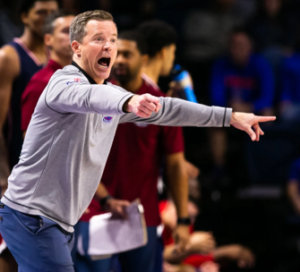By Rose O. Sherman, EdD, RN, NEA-BC, FAAN
 They call the NCAA Basketball finals March Madness for a reason. The unpredictable can and does happen. How does a little-known team with few nationally recruited players make it to the NCAA tournament for the first time and then to the final four? The team is Florida Atlantic University. They lost by one point on Saturday night to San Diego State but won the hearts and minds of the basketball audience. Their coach, Dusty May, was named the 2023 NCAA coach of the year. Throughout this tournament, he was heavily recruited by basketball programs across the country.
They call the NCAA Basketball finals March Madness for a reason. The unpredictable can and does happen. How does a little-known team with few nationally recruited players make it to the NCAA tournament for the first time and then to the final four? The team is Florida Atlantic University. They lost by one point on Saturday night to San Diego State but won the hearts and minds of the basketball audience. Their coach, Dusty May, was named the 2023 NCAA coach of the year. Throughout this tournament, he was heavily recruited by basketball programs across the country.
In the end, he signed another year’s contract at FAU. He told the Palm Beach Post, it has never been about the money – I want to be happy in my work, and I am. I need to show these players that you don’t just take the money and run. We have built something here and can continue to build on it. Listening to him reminds me of the late John Wooden, UCLA’s basketball coach. He coached many legendary basketball players who talk even today about what a remarkable life coach he was.
I have watched this Cinderella team’s progress with great interest. I am a retired FAU professor who has lived in Florida for most of my life. The odds of this team achieving this goal in a state with athletic powerhouses were slim. Recruiting is challenging when your basketball budget dwarfs others who are only miles away. Yet, in some ways, this was their superpower. No NBA scouts were attending every game to recruit players from the program. FAU was not a one-and-done team of players anxious to make their mark and move on. Most had played together for two to three years. Coach May has built the program over the past five years. They were not reliant on a few superstars. The team had depth.
What you saw with FAU was the power of teamwork and outstanding coaching. Coach May talks relentlessly about a teamwork mindset. He was recently quoted as saying, “in a world where every player wants to keep the whole pie for themselves, these guys continue to share the pie every day with each other. No one player carries this team-everyone matters, and these kids know I love them – all of them.”
The biggest takeaway from this story is that teamwork matters. Leadership author John Maxwell cited the Law of Everest in his work on teamwork. As challenges in the environment escalate, he observes, the need for teamwork elevates. There is power in teamwork, and teams will generally outperform individuals. When you bring together healthcare staff with complementary skills, a shared purpose, and mutual accountability, a synergy develops that can overcome the greatest challenges.
As I conduct Rebuilding Teams workshops throughout the country, nurse leaders mourn the current lack of teamwork in nursing, which is so core to our work. Yet, in a crisis, even the most effective teams can unravel. We have watched this happen post-COVID. Individual team members were overwhelmed by this life-quake experience, leading them to question how they should move forward in their personal lives and careers.
Leaders now look to develop innovative models of care delivery. These models, including virtual models, all, have one thing in common – care delivery is team-based. We need both these new models and the teamwork infrastructure to support them. Don’t assume that effective teamwork exists or will happen without intentionally promoting and teaching it. As Coach May wisely observes about teamwork, you must see it to be it. Great coaching and teamwork will also be essential in the future of nursing.
Rebuilding Your Nursing Team in 2023: Coming Together after Falling Apart – Click Here for the Flyer



 LinkedIn
LinkedIn Instagram
Instagram